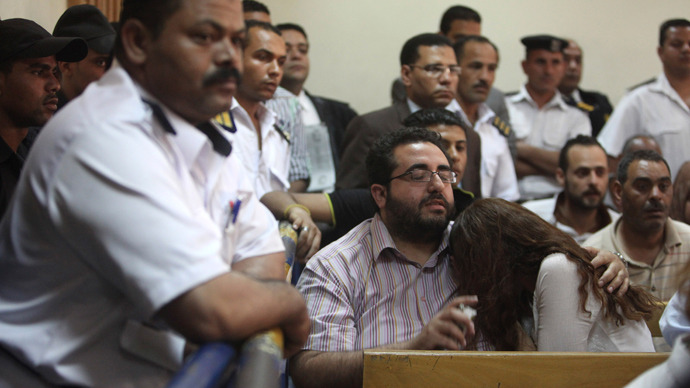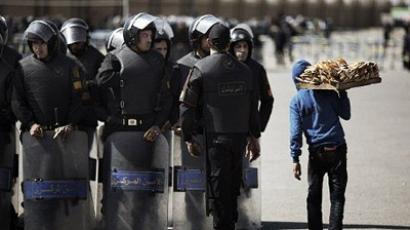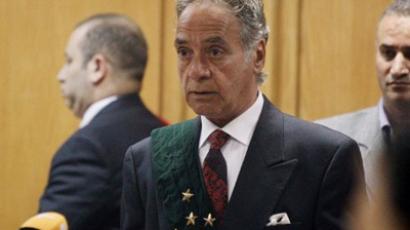Egypt courts hands jail terms to 43 NGO workers, including 15 US citizens

Cairo criminal court has convicted 43 NGO workers, including at least 16 Americans, for illegally operating in Egypt. It also ordered the closure of offices and the seizure of assets belonging to US NGOs.
The court sentenced Egyptian and foreign defendants, most of whom
were not present at the hearing, to jail terms of one to five
years.
Twenty-seven defendants received five years in prison, another
five - two years and 11 were given one-year terms.
Judge Makram Awad gave five-year sentences in absentia to at
least 15 US citizens who were not in the country.
Many of the foreigners - nationals of the US, five Serbs, two
Germans and three non-Egyptian Arab nationals - have already left
the country.
Among the Americans is Sam LaHood, the head of the Egypt office
of the Washington-based International Republican Institute and
the son of the US Transportation Secretary. He managed to leave
the country after a travel ban against them was lifted in March
2012. All of them were initially barred from leaving Egypt.
The defendants say they will appeal against the sentences,
according to AFP.
Besides the jail terms, the court ordered the closure of the
non-governmental organizations, including the US-based
International Republican Institute (IRI), chaired by Republican
senator John McCain, and the National Democratic Institute (NDI),
Freedom House and Germany's Konrad Adenauer Foundation.
However, the NGOs deny the charges. They insist the Egyptian
government knew about their activities throughout the country.
For instance, NDI claims that it was given formal permission to
conduct monitoring for the country's first democratic elections
that followed the ouster of Hosni Mubarak.
The NGO scandal, which has already soured relations between Egypt
and the US, dates back to December 2011. At that time police
conducted armed raids on 17 NGO offices across Cairo,
detaining employees and seizing equipment. The Egyptian military
government accused 43 employees of non-profit groups of illegally
using foreign funds to instigate unrest in the country. The US
characterized the raids as "inconsistent with the bilateral
cooperation”.
Tuesday’s verdict has already been predicted to worsen already
strained relations between former allies.
For more than three decades the two states cooperated with the
Egyptian military receiving more than $1bn (£650m) in aid
annually. In addition to the $1.3bn in US military aid, Egypt
also receives about $250m in economic aid every year.
The US, which backed the Egyptian regime change during the Arab
Spring, has slammed the sentences handed to the NGO workers.
Secretary of State, John Kerry, called the rulings by the Cairo
court a "politically-motivated" trial.
"This decision runs contrary to the universal principle of
freedom of association and is incompatible with the transition to
democracy," Kerry is cited as saying by AFP.
The Secretary of State added that the closure of the offices of
the non-governmental organizations "contradicts the government
of Egypt's commitments to support the role of civil society as a
fundamental actor in a democracy."
Germany has responded to the verdict saying it was "outraged
and highly disturbed". Foreign Minister Guido Westerwelle
said that Germany would support the defendants in their efforts
to have the court's decision reversed.
Meanwhile, Egypt’s Parliamentarians are debating a new bill,
which Human Rights Watch and 40 Egyptian rights groups fear will
restrict the funding and activities of NGOs in the country.
Proposed by Islamist President Mohammed Morsi, the bill is aimed
at committing NGOs to the principles of transparency and striking
a balance with "the openness of Egypt", Morsi said
earlier. Once signed into law, it would allow the state to
control NGOs' activities as well as their domestic and
international funding.
Last week the New York-based Human Rights Watch and 40 Egyptian
rights groups expressed concerns that a draft law would undermine
liberties in the country.
Under Mubarak, local and foreign NGOs were not allowed to align
themselves with political parties, involvement in politics was
tightly restricted.














